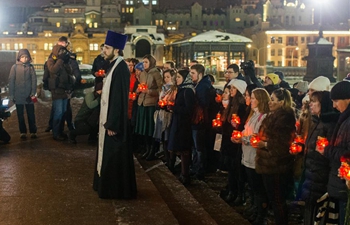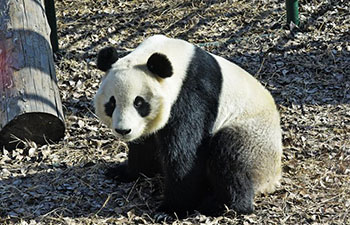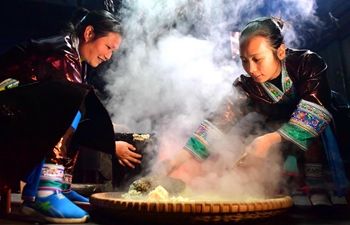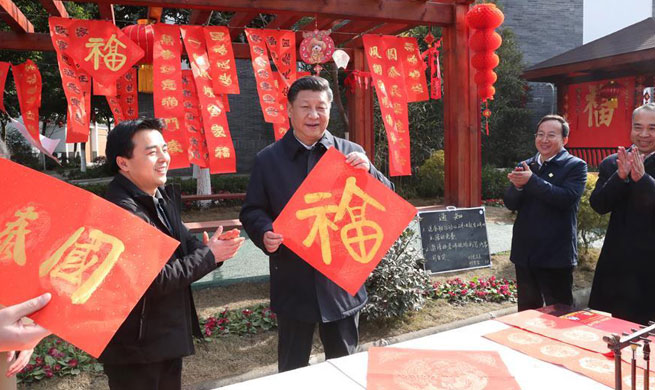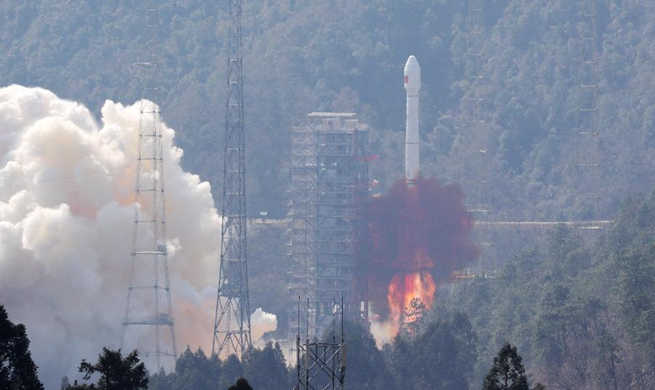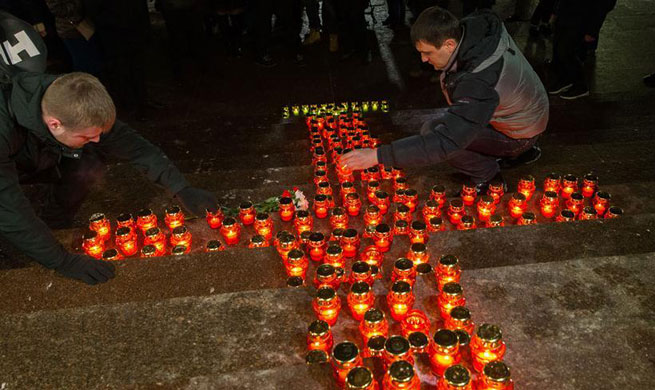By Xinhua writer Xia Xiao
BEIJING, Feb. 13 (Xinhua) -- Woof, woof, the dog is barking at the door. The Chinese Year of Dog begins on February 16.
The Lunar New Year, or Spring Festival, is not only the most important festival in China, but also celebrated worldwide by people who are interested in Chinese culture.
CELEBRATING AROUND THE WORLD
As one of the most influential festivals in the world, Chinese New Year celebrations will be held more than 400 cities in more than 130 countries and regions, according to the State Council Information Office.
In some countries, such as Malaysia, Singapore, Mauritius and Suriname, the Chinese New Year has become a statutory holiday.
Events such as galas, dragon and lion dance performances, exhibitions, and temple fairs are being held in towns and cities across the world.
In previous years, heads of state and government and leaders of international organizations have delivered their best wishes for the Chinese New Year.
Celebrations last for two weeks or more. One of the first to open was the "New Era, New Journey" Spring Festival Gala on Feb. 7 at Indigo O2 in London, which was organized by the Chinese Students and Scholars Association United Kingdom (CSSAUK) and supported by the Chinese embassy in the United Kingdom.
At the London Confucius Institute at SOAS University of London, international students played traditional instruments like bamboo flutes, sang folk songs from minority groups and told classic stories to celebrate the Chinese New Year.
The grand celebrations for the 2017 Chinese New Year in Trafalgar Square in the center of London attracted more than 700,000 visitors from various countries. The jubilant scene will be held again this year.
Britain, the United States, France, Australia, Malaysia, Indonesia and Hungary have issued commemorative stamps and coins with Chinese New Year elements.
EAST OR WEST, HAPPINESS IS BEST
How do Chinese celebrate the New Year? There are various answers from people in different regions.
Traditionally Chinese New Year celebrations begin on the eve of the New Year and end on the Lantern Festival, the 15th day of the first calendar month.
In China, there is a week-long public holiday, during which family gatherings, meeting friends, and attending banquets are common activities.
New trends are emerging as a growing number of Chinese choose to travel domestically or internationally instead of returning to their hometowns for the holiday.
A report released by the China Tourism Academy and Ctrip said an estimated 6.5 million Chinese will travel abroad during 2018 Spring Festival holiday, which is equivalent to the same period in 2017.
People from more than 200 Chinese cities have booked tours to over 700 cities in 68 countries and regions on Ctrip, a popular online travel agency based in Shanghai.
Top destinations include Thailand, Japan, Singapore, Vietnam, the United Arab Emirates and Nordic countries, according to the report.
The China National Tourism Administration said that 385 million trips, mostly domestic, are expected to be made during the Spring Festival 2018, up 12 percent year on year. Tourism revenue during the holiday will increase to 476 billion yuan (76 billion U.S. dollars), a rise of 12.5 percent from the previous year.
OLD TRADITIONS, NEW TECHNOLOGY
Spring Festival customs vary across different regions, but some general changes have taken place in recent years.
First of all, China's high-speed trains have brought huge changes to the annual Spring Festival travel rush, known as the "Chunyun."
Hundreds of millions of people travel long distances to return home for family gatherings during the holiday. Journeys that previously took several days now take just hours.
Thanks to high-speed trains and expanded railway networks, the perceived distance between migrant workers and their hometowns has been reduced.
China's railway network is expected to exceed 175,000 km in length by 2025, compared with 127,000 km of operating tracks at the end of 2017. The country will have 38,000 km of high-speed rail tracks by 2025, from just 25,000 km at the end of 2017, according to China Railway Corporation.
The country's high-speed rail tracks accounted for 66.3 percent of the world total at the end of 2017.
Decades ago, it would take more than 24 hours to travel the 1,300 km from Beijing to Shanghai, now, it takes just four hours.
In 2018, the Spring Festival travel rush began on Feb. 1 and will last until March 12, with more than 390 million passengers expected to travel by rail.
Travelers can now buy train tickets online, rather than lining up for days in front of ticket windows at railway stations.
Due to the rapid development of the internet economy, China has become a leader in moving toward a "cashless society," which has also influenced some customs of the Spring Festival.
For instance, red envelopes containing money, known as hongbao in Chinese, should be given to family members and friends during the festival. However, there is now no need for physical envelopes, as one click on a mobile phone can immediately send one or any number of digital red envelopes to one person or group via mobile payment platforms.
A report released by Chinese internet giant Tencent said users of WeChat, its instant messaging app, send about 46 billion electronic red envelopes from the Eve through the first five days of 2017 Lunar New Year.
Meanwhile, Chinese tourists can shop overseas using their mobile phones as more shops and markets are providing access to Chinese online and mobile payment services such as WeChat Pay and Alipay. Travelers don't need to exchange foreign currency, as the payment platforms directly charge their accounts in Chinese RMB.
Chinese travellers can now also have their tax refunds sent to Chinese online and mobile payment platforms when they leave some countries.
Many families used to visit markets to stock up food supplies for the holiday. While many still continue the tradition, others now order food or ready-made meals online.
From pork, chicken, vegetables, to Boston lobster, Alaskan king crab, fruit from Southeast Asia, almost any food can be ordered online and delivered to your door.





